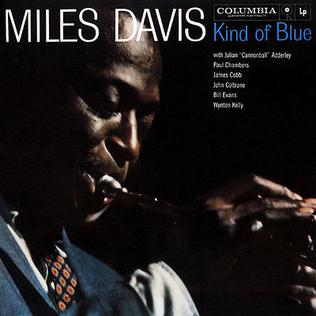
Kind of Blue is a studio album by the American jazz trumpeter and composer Miles Davis. It was released on August 17, 1959 through Columbia Records. For the recording, Davis led a sextet featuring saxophonists John Coltrane and Julian "Cannonball" Adderley, pianist Bill Evans, bassist Paul Chambers, and drummer Jimmy Cobb, with new band pianist Wynton Kelly appearing on one track—"Freddie Freeloader"—instead of Evans. The album was recorded in two sessions on March 2 and April 22, 1959, at Columbia's 30th Street Studio in New York City.

Miles Ahead is an album by Miles Davis that was released in October 1957 by Columbia Records. It was Davis' first collaboration with arranger Gil Evans following the Birth of the Cool sessions. Along with their subsequent collaborations Porgy and Bess (1959) and Sketches of Spain (1960), Miles Ahead is one of the most famous recordings of Third Stream, a fusion of jazz, European classical, and world musics. Davis played flugelhorn throughout.
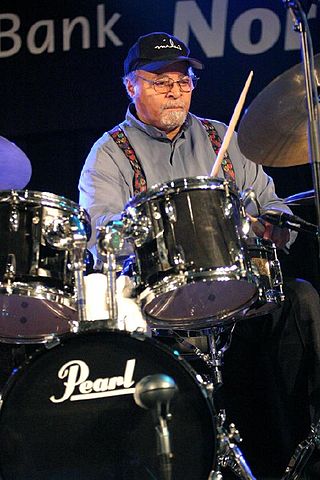
Wilbur James "Jimmy" Cobb was an American jazz drummer. He was part of Miles Davis's First Great Sextet. At the time of his death, he had been the Sextet's last surviving member for nearly thirty years. He was awarded an NEA Jazz Masters Fellowship in 2009.

'Round About Midnight is a studio album by the jazz trumpeter and composer Miles Davis with his quintet. It was released through Columbia Records in March 1957, and is Davis's first record on the label. The recording took place at Columbia's New York studio in three sessions between October 1955 and September 1956.

Steamin' with the Miles Davis Quintet is an album by the Miles Davis Quintet which was released in July or August 1961 through Prestige Records. The recording was made at two sessions on May 11 and October 26, 1956 that produced four albums: Steamin, Relaxin' with The Miles Davis Quintet, Workin' with The Miles Davis Quintet and Cookin' with the Miles Davis Quintet.

Someday My Prince Will Come is the seventh studio album by Miles Davis for Columbia Records, catalogue CL 1656 and CS 8456 in stereo, released in 1961. Recorded at Columbia's 30th Street Studio in Manhattan, New York City, it marked the only Miles Davis Quintet studio recording session to feature saxophonist Hank Mobley.

Seven Steps to Heaven is a studio album by the jazz musician Miles Davis. It was released through Columbia Records on July 15, 1963. The recording took place at Columbia Studios in Los Angeles in April 1963, and at Columbia's 30th Street Studios in Manhattan in May 1963. It presents the Miles Davis Quintet in transition, with the New York session introducing the rhythm section of Herbie Hancock, Ron Carter and Tony Williams, who would become Davis' regular sidemen for the next five years. Upon release, the album was Davis' most successful on the Billboard pop LPs chart up to that point, peaking at number 62.

Miles Davis was an American trumpeter, bandleader and musical composer. His discography consists of at least 60 studio albums and 39 live albums, as well as 46 compilation albums, 27 box sets, 4 soundtrack albums, 57 singles and 3 remix albums.

Miles: The New Miles Davis Quintet is a studio album by the jazz musician Miles Davis which was released in April 1956 through Prestige Records. It is the debut record by the Miles Davis Quintet, and generally known by the original title Miles as indicated on the cover.

The Complete Columbia Recordings of Miles Davis with John Coltrane is a box set featuring jazz musicians Miles Davis and John Coltrane. It is the first box set in a series of eight from Columbia/Legacy compiling Davis's work for Columbia Records, and includes never-before-released alternate takes, omissions of other musicians, musician comments, false starts and a first version of compositions, some of which have made it to the 50th Anniversary 2-disc CD version of Kind of Blue. Originally issued on April 11, 2000, in a limited-edition metal slipcase, it was reissued in 2004 in an oversized book format. In conjunction with Sony, Mosaic Records released the 9-LP set.
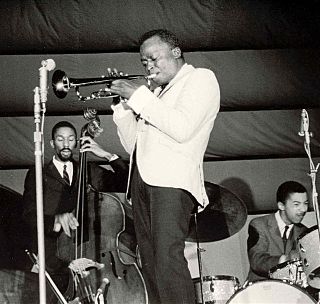
The Miles Davis Quintet was an American jazz band from 1955 to early 1969 led by Miles Davis. The quintet underwent frequent personnel changes toward its metamorphosis into a different ensemble in 1969. Most references pertain to two distinct and relatively stable bands: the First Great Quintet from 1955 to 1958, and the Second Great Quintet from late 1964 to early 1969, Davis being the only constant throughout.

Introducing Wayne Shorter is the debut album by jazz saxophonist Wayne Shorter. It was recorded on November 9 and 10, 1959, at Bell Sound Studios in New York City. It features five Shorter compositions, plus Kurt Weill's "Mack the Knife”, performed by a quintet featuring trumpeter Lee Morgan, pianist Wynton Kelly, bassist Paul Chambers and drummer Jimmy Cobb. Shorter played with Morgan in the front line of Art Blakey's Jazz Messengers at this time while Kelly, Chambers and Cobb were the widely celebrated rhythm section with Miles Davis.

Miles Davis & Gil Evans: The Complete Columbia Studio Recordings is a box set of music by jazz musicians Miles Davis and Gil Evans originally released on CD in 1996 and remastered and re-released in 2004. It collects work from 1957 through 1968 at Columbia Records recording studios.

In Person Friday and Saturday Nights at the Blackhawk, Complete, also called The Complete Blackhawk, is a 2003 four-disc collection of the 1961 live performances of the Miles Davis Quintet at the Black Hawk nightclub in San Francisco. These sets, performed with recording in mind, forged new ground for jazz musician Miles Davis, who had never previously been recorded live in a club with his combo. Material from the four sets was first released simultaneously by Columbia Records on two albums in September 1961, titled In Person Friday Night at the Blackhawk, San Francisco, Volume 1 and In Person Saturday Night at the Blackhawk, San Francisco, Volume 2. Although those albums were rereleased several times, the complete sets were not commercially available until Sony Records released a digital mastering of this collection. Simultaneous to this release, the material was made available as two separate double-albums, entitled Friday Night: In Person at the Blackhawk in San Francisco, Complete and Saturday Night: In Person at the Blackhawk in San Francisco, Complete. In conjunction with Sony, Mosaic Records released the 6 LP set.

Tokyo Live is a live jazz album released by The Free Spirits on Verve in 1994. Despite the group credit on the sleeve, the record is generally considered to be a McLaughlin solo album.

Quiet Nights is a studio album by the American jazz trumpeter Miles Davis, and his fourth album collaboration with arranger and conductor Gil Evans, released in 1963 on Columbia Records, catalogue CL 2106 and CS 8906 in stereo. Recorded mostly at Columbia's 30th Street Studios in Manhattan, it is the final album by Davis and Evans.

Directions is a compilation album by American jazz musician Miles Davis, released in 1981 by Columbia Records. It collects previously unreleased outtakes that Davis recorded between 1960 and 1970. Directions was the last of a series of compilation albums—mostly consisting of, at that time, previously unreleased music—that Columbia released to bridge Davis' recording hiatus that ended with the Man with the Horn in July 1981.
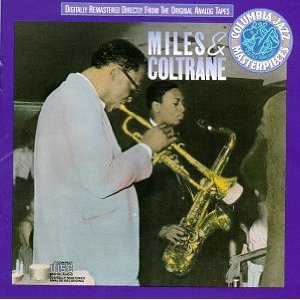
Miles & Coltrane is a live album by American jazz musician Miles Davis, released in 1988 by Columbia Records. The music was recorded at two different shows—one on July 4, 1958, at the Newport Jazz Festival, and one from October 27, 1955, in New York. The tracks have been digitally remastered directly from the original analog tapes.

Basic Miles: The Classic Performances of Miles Davis is a compilation album by American jazz musician Miles Davis, released in 1973 by Columbia Records and recorded from 1955 through 1962.
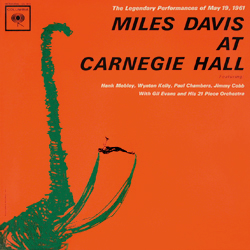
Miles Davis at Carnegie Hall: The Legendary Performances of May 19, 1961 is a live album by American jazz musician Miles Davis originally released by Columbia in 1962.




















